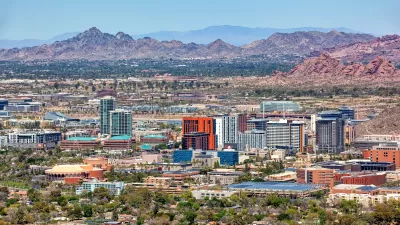Transit-oriented development will play a key role in mitigating the congestion effects of growing population in the region around the nation's capital, and regional planners say the region is already achieving its goals.

"The number of people expected to move to the D.C. area in the next 25 years is equal to the entire population of Philadelphia, and plans are in the works to prevent the anticipated addition of 1.5 million residents from worsening the region’s gridlock," reports Kristi King.
The key to the growth plan: transit-oriented development. "The concept of building housing closer to jobs is replacing the dominant philosophy of the past, to 'drive until you qualify' which had people living far out in the suburbs to be able to afford a mortgage," according to King.
Metropolitan Washington Council of Governments Executive Director Chuck Bean is quoted in the article touting the region's success in meeting transit-oriented development goals set earlier this decade.
King also cites a few transportation projects as key to the growth strategy, such as plans for a new American Legion Bridge and a plan to expand the rail capacity of the Long Bridge crossing across the Potomac River.
FULL STORY: How DC-area leaders are planning for expected 1.5 million new residents over next 25 years

Planetizen Federal Action Tracker
A weekly monitor of how Trump’s orders and actions are impacting planners and planning in America.

Maui's Vacation Rental Debate Turns Ugly
Verbal attacks, misinformation campaigns and fistfights plague a high-stakes debate to convert thousands of vacation rentals into long-term housing.

Restaurant Patios Were a Pandemic Win — Why Were They so Hard to Keep?
Social distancing requirements and changes in travel patterns prompted cities to pilot new uses for street and sidewalk space. Then it got complicated.

In California Battle of Housing vs. Environment, Housing Just Won
A new state law significantly limits the power of CEQA, an environmental review law that served as a powerful tool for blocking new development.

Boulder Eliminates Parking Minimums Citywide
Officials estimate the cost of building a single underground parking space at up to $100,000.

Orange County, Florida Adopts Largest US “Sprawl Repair” Code
The ‘Orange Code’ seeks to rectify decades of sprawl-inducing, car-oriented development.
Urban Design for Planners 1: Software Tools
This six-course series explores essential urban design concepts using open source software and equips planners with the tools they need to participate fully in the urban design process.
Planning for Universal Design
Learn the tools for implementing Universal Design in planning regulations.
Heyer Gruel & Associates PA
JM Goldson LLC
Custer County Colorado
City of Camden Redevelopment Agency
City of Astoria
Transportation Research & Education Center (TREC) at Portland State University
Jefferson Parish Government
Camden Redevelopment Agency
City of Claremont





























